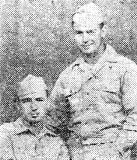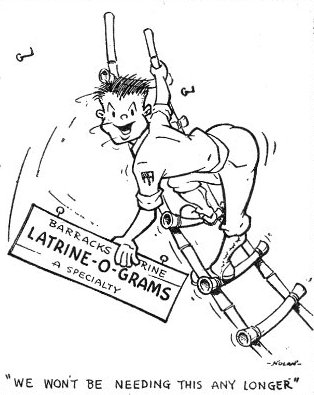
VOL. II NO. 18 REG NO. L5015 DELHI, THURSDAY JANUARY 13, 1944.
|
FOR HERCULEAN VICTORY OVER "HUMP"
Proudly, Brig. Gen. Earl S. Hoag, his staff, and Maj. Gen. George E. Stratemeyer, Commanding General of all American Air Forces in India and of the Eastern Air Command, stood at attention in the crisp winter air of a recent Delhi morning.
To these key officers, Maj. Gen. Dan I. Sultan read a citation from President Roosevelt unprecedented
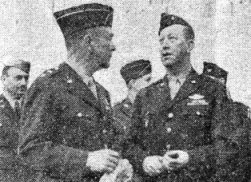
|
Thus was the veil of secrecy, after 13 long months, lifted from the epic story of "The Hump."
Sultan, Lt. Gen. Joseph W. Stilwell's Deputy Commander, holding the radiogram addressed to the Theater Commander, read: "The goal has been high, the air route exceedingly dangerous both as to mountains and enemy action and the weather treacherous. Only very fine teamwork and outstanding devotion to duty by the entire personnel could have made this accomplishment possible. I have directed the citation of the Wing and desire that my personal thanks be communicated to every officer and man concerned."
The President, informed of the Herculean effort of the ATC during December, considered this "an exceptionally outstanding performance and a source of great satisfaction to me."
|
CAPRICIOUS WEATHER FAILS TO HALT
EASTERN AIR COMMAND BOMBERS
Troops, Dumps, Transport, Take Pounding
American mediums and fighter-bombers of the Eastern Air Command maintained their attacks on communication centers, troop and supply concentrations, oil installations and railroad bridges in Burma this week, despite capricious weather conditions.
A Japanese supply dump at the Sahmaw junction of the Burma railroad with the Mogaung-Manywet road was blasted on Jan. 6. Bombs struck piles of stores and demolished three buildings. The next day a troop concentration and supply dump at Nanyaseik, north of Kamaing, were heavily bombed. Fighter-bombers came back on the 10th to bomb a Japanese bivouac area, which was then strafed.
BRIDGE DESTROYED
A railroad bridge north of Hopin was knocked out on Jan. 8; a large warehouse along the tracks was destroyed and trackage was torn up throughout the town. On a sweep from Hopin to Mogaung, 40 cars were shot up and a locomotive destroyed.
Two other rail bridges were attacked on the 9th and 10th, respectively; the Loilaw by-pass bridge already hit last week, was skip-bombed by fighter-bombers and left unserviceable. Bombs fell on Loilaw and Budagon, a small town through which the by-pass runs. Direct hits were scored on a large building in Loilaw housing enemy personnel and ammunition stores. The building exploded, shooting flames up to 1,000 feet which were visible 75 miles away. Heavy demolition bombs were dropped with excellent results over the Namti railroad bridge. Tracks at the south approach were damaged and rolling stock was shot up.
TWO FIRES STARTED
In South Burma, on Jan.7, mediums and fighter-bombers attacked the oil installations at Lanywa, on the Irrawaddy. Two large storage tanks were hit, starting huge fires, buildings in the workshop area were demolished and a machine gun position was silenced.
During the same period, the RAF was active in all sectors, bombing and strafing northern targets, conducting sweeps against river traffic in the Arakan and enemy positions in the Mayu Peninsula. The Akyab airfields were shot up by fighters, and bombers raided Paleik, Sagaing, Monywa and Myingyan.
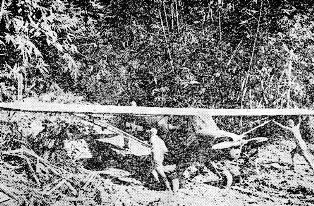 The line crew disperses one of the tiny L-4 liaison planes among the bamboo thickets of the tangled jungle.
The line crew disperses one of the tiny L-4 liaison planes among the bamboo thickets of the tangled jungle.
|
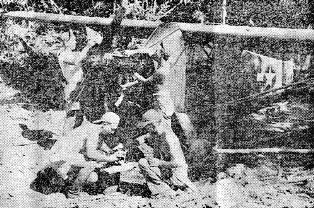 Repair shop. Foreground, l-r, Sgt. Dave Watkins and T/Sgt. Charles Procter, line chief. Background, Cpls.
James Vild and Bob Vencil.
Repair shop. Foreground, l-r, Sgt. Dave Watkins and T/Sgt. Charles Procter, line chief. Background, Cpls.
James Vild and Bob Vencil.
|
|
|
DOES YEOMAN JOB
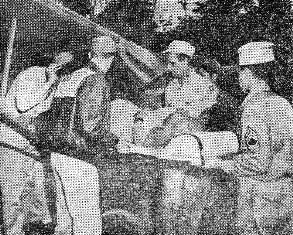 A wounded Chinese soldier is removed from one of the squadron's Cubs after a flight from a jungle outpost in
the first evacuation of such a kind.
A wounded Chinese soldier is removed from one of the squadron's Cubs after a flight from a jungle outpost in
the first evacuation of such a kind.
|
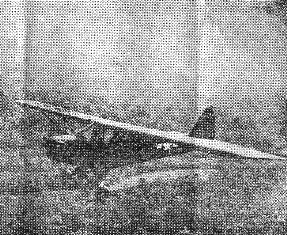 Here is one of the typical stretches of territory over which the liaison planes must fly their daily missions
over Assam-Burma jungles.
Here is one of the typical stretches of territory over which the liaison planes must fly their daily missions
over Assam-Burma jungles.
|
14TH AIR FORCE RAIDS SIAM IN INACTIVE WEEK
14TH A.F. HQ. - During the past week, only one communiqu was released from 14th Air Force headquarters. It stated that Liberators, with fighter escort, paid a return visit to Lampang, deep in Thailand, and dropped 10 tons of bombs on the target area. Though observation was limited by clouds, Japanese installations are believed to have been gutted.
At the same time, fighter-bombers attacked Pin-Ga, Japanese-held town in the Western Yunnan Province. An ammunition dump was hit and a large explosion sent smoke thousands of feet skyward. The fighters then strafed, and reported that when they left most of the town was in flames. All aircraft returned safely.
|
BANSHEES PROTECT HUMP JUMPERS FERRYING SUPPLIES TO CHINA
Fighter Group Keeps Watch For Japanese
(Editor's Note - Last week, the Air Transport Command gave the "go ahead" signal on Hump publicity and the Roundup editorialized on the epic task the Hump Jumpers have performed and are continuing to perform to keep vital war materials flowing to China. Today, the following article, which reached the editor's desk several weeks ago, is thus releasable.)
The Burma Banshees. Flying the Hump, in good weather and bad, ceaselessly patrolling the vital supply link to China, this fighter group is fast making history in CBI-land for the most flying hours to its credit of any fighter organization, the greatest number of missions over enemy territory. High above the sharp spine of the Himalayas, its P-40's drone, day in and day out, guarding with jealous care the lumbering transports, spoiling for scraps, getting few from the now wary enemy.
The Banshees were not always a patrol organization. Only a year ago, the men were sitting on Long Island, coaxing the utmost out of the now-famous P-47, nursing it through its youthful tantrums, grooming it for combat against new, powerful German fighters. The outfit was destined for England.
FATE INTERVENED
Then fate intervened. The Banshees were reassigned to P-40's, cramped themselves into smaller cockpits in the more compact killer, relearned the ways of the Curtiss ship. They were then shipped . . . not to England . . . but to the CBI Theater.
In the dense jungle, the crews had their first taste of leeches, mosquitoes and that (censored) weather. Insistent insects maintained a constant, high-pitched whistling in the trees. But eventually, despite discomforts, it became home.
The Banshees, eager to prove themselves as fighter pilots, had to wait. Their first targets were on the ground. So they adapted themselves to bombing. With "eggs" varying in size from small frag to 1,000-pounders, they crippled the Jap in every way they knew how - his bridges, towns, railways, supply dumps.
Then the enemy started making trouble for the Air Transport Command's supply-carrying ships on their Hump trip. Protection was needed, urgently, immediately. The Banshees were "on the spot."
ACCOMPLISHING MISSION
Military security forbids telling how the Banshees made their mission effective. But it is no secret that the P-40's are measuring up to the task. It is a big job, a long job, often a dull job, but the Banshees are up to it. The group, itching for a scrap, encountered enemy planes recently, but these disappeared into space before they could be intercepted.
Staring white skulls have replaced the well-known shark nose on their ships. The Banshees also like to be known as Angels . . . Guardian Angels to the transports, Angels of Death to the enemy.
|
NEARING FINISH AT INDIA BOMBER BASE
EASTERN INDIA HEAVY BOMBER BASE - Interest here is focused upon the "500-Hour Combat Derby" now entering the home stretch, with the honors, barring mishap, certain to be won by either Capt. Ralph Olson or T/Sgt. Jerri Nibling. Both have piled up over 475 hours of combat time over Burma and the half century goal is in sight.
Odds favor Olson, for the tall, slim Minnesotan leads the sergeant and pilots the B-24 on which Nibling is the engineer and top-turret gunner.
|
Olson and Nibling grew up to combat together. They teamed in their first baptism of ack-ack Feb. 8 when they helped loose destruction from the skies upon Rangoon.
Those 475-plus combat hours haven't been milk runs. There was the day when eight Zeros jumped their ship and Nibling chalked up his first confirmed Jap plane. Another time, 30 Zeros individually made passes at them when they led a bombing run on a target. Recently, they made the longest mission in history when they traveled to Bangkok.
Olson's favorite mission is described as the time his Liberator helped sink a Jap boat in the Bay of Bengal. Lt. Leland Burlette's plane, coming in first, missed the target, but slowed it up. Olson followed with three direct hits on the bow. Squadron Commander Maj. Werner then came in for the kill. From the beginning of the attack until the ship sank, only six minutes elapsed.
The two 400-hour crews at this base are:
1 - Capt. Ralph Olson, pilot; Lt. Roy F. Shaw, co-pilot; Lt. James Traweek, navigator; Lt. Kemmer O. Camp, bombardier; T/Sgt. Theodore F. Smith, engineer; T/Sgt. Ernest Neil, radioman; S/Sgt. Warren W. Stubbs, tail-gunner; and S/Sgt. Ralph Perrone, ball-turret gunner.
2 - Lt. Leland Burlette, pilot; Lt. Patrick Lawney, co-pilot; Lt. William Gowen, navigator; Lt. James Lockebell, bombardier; T/Sgt. William Ober, engineer; T/Sgt. Leonard Prough, radioman; S/Sgt. Marshall Reuth, ball-turret gunner; S/Sgt. Cornelius Dean, waist gunner; and S/Sgt. James Morris, tail-gunner.
|
For once at least, the CBI Theater is not at the "end of the line," but right up there with the front-runners.
This is in the matter of the application of the War Department's new policy of rotating overseas personnel in order to permit shipment home of all men who have served two years or more in an overseas Theater.
As explained in detail in the "Going Home" story below, the new policy applies in full force to the Theater God forgot but the War Department evidently remembered. Other theaters affected, according to an Associated Press dispatch from Washington which quotes Senator Robert Reynolds, chairman of the Senate Military Affairs Committee, are at present Alaska and the Caribbean.
Which, to date, leaves North Africa, Italy, England, Iceland, North Ireland, the Panama Canal Zone and other U.S. overseas bases out in the cold so far as the new policy is concerned. Reynolds said that a plan is being studied concerning the rotation of a limited number of men on duty in North Africa and the South Pacific, but it has not gone into effect yet.
Concerning the European Theater, Reynolds said: "Up to the present time, men in this Theater other than air crews, have not been subjected to combat fatigue, and climatic conditions do not necessitate a change. As the situation changes in the European Theater, a system will be put into effect there."
Unfortunate G.I.'s who have been sweating it out in the wilds of London will, therefore, have to continue to sweat it out, while those who have enjoyed two years of thrills and excitement in the romantic East may soon be home exhibiting their overseas ribbons and recounting their deeds of derring-do to appreciative home front females.
Cincheroo Job
FOR LIEUTENANT
STRASBURG, PA. - (ANS) - When the U.S. Government took over the nation's railroads, Lt. Robert E. Mulgannon was assigned to Lancaster County's Strasburg Railroad to see that operations were not interrupted, but so far his responsibilities have not proven extensive.
The reason: The Strasburg line has only four miles of track between the villages of Strasburg and Leaman, plus one gasoline engine and one freight car.
Its operational staff consists of Chief of Police Thomas H. Blair, who serves as engineer, and Raymond Althouse, who does everything else.
|
CHINA - The engine change story to end all others was made here recently at a 14th A.F. base when 13 members of the "Blitzer" Squadron collaborated to put a P-40K-1 airplane into the air exactly 3 hours and 21 minutes after it had been called out of commission for engine change.
The play-by-play on what is believed to be the fastest job of its kind on record: The plane was called out of commission at 0807 hours; the engine change had been completed at 1025, and the engine ground test at 1055; by the time the cowling had been buttoned back on and the ship declared "in" again, it was only 1125; three minutes later it was airborne, and an hour's slow time had been finished at 1228.
Supervised by Engineering Officer Lt. Weldon S. Deck, the men who shared in this job were: M/Sgt. Curtis R. Spears, in charge; T/Sgt. Wellington W. White, inspector; T/Sgts. Jack Scorgie, Cecil A. Stephens and Thomas W. Zeitz; S/Sgt. Charles T. Shimp, crew chief; S/Sgts. Linus J. Heiser, Ray R. Siber, Myron S. Gilbertson, Edward C. Webb and Kenneth J. Thorstad; and Sgt. James Simon.
|
CHAPLAIN MAKES PLEA FOR CBI
WASHINGTON - (UP) - Maj. John S. Barrenton, Army chaplain, returned from the CBI Theater and told a press conference that people of the United States were really not aware of the seriousness of the war.
The major said that the lowest thing he could think of was the "wife who plays around over here with another man while her husband goes through Hell, sweat and blood, overseas."
He said the next lowest thing is "the man who plays around with her."
Barrenton declared that requests for divorce and broken engagements are a great cause of anxiety among the troops.
The issue of votes for servicemen, he said, "are not in the minds of the men right now."
The chaplain told that the men are thinking more than they ever did before about religion.
S.O.S.
ROUNDUP NEEDS C.B.I. GOSSIP
Chums, the number of literary contributions from the rank and file of CBI-land has reached an unflattering and disconcerting low.
Ye Ed feels - and he knows you agree - that your Theater fishwrapper needs a proportionate share of local news, along with ANS and UP reports from Stateside and the various war fronts.
But the Roundup must rely on YOU to supply Theater yarns. Surely, something of interest must be happening in your neck of the woods . . . Joe Glotz shot down his fifth Zero, Pete Whatzis bagged a tiger with a slingshot of Phineas Throttlebottom turned down a trip home because he stoutly maintains he likes it in India or China.
Not only that, but you've probably got some swell pictures with your box Brownie.
For gosh sakes, get of the anna.
Our address: Roundup, Rear Echelon HQ, APO 885 (Delhi, India).
THREE AFTC FLIERS HONORED BY CHINA
APO 882 - Three members of the Instructor's Corps of the China-Burma-India Air Forces Training Command this week were presented with Gold Air Hero medals, awarded to them by the All China Troops Comforting Association in recognition for having shot down one or more enemy planes or successful accomplishment of bombing missions against enemy installations in China.
The three honored were Capts. Thomas James Clark, of Ligonnier, Pa., and George Dorman, of Annister, Ala., and Lt. Robert Stewart Ellis, of Weston, Mass. In a letter accompanying the awards, Ku Cheng-kang, acting president of the All China Troops Comforting Association, expressed the "profound admiration and gratitude" of the Chinese for the men "who have been carrying on our common cause against the enemy."
|
APO 433 G.I.'s Given Chuckle From Flicker
APO 433 (Kurmitola, India) - It was one of those amazing coincidences that occurs once in a lifetime.
During the showing of Stand By For Action, there came a scene in which a woman aboard a destroyer on convoy duty was about to have a baby. As the ship did not carry a doctor, she signaled the flagship of the convoy for medical advice. When the admiral (Charles Laughton) received the request, he referred it to the ship's physician, who, after much squirming and sputtering, indignantly said:
"Sir, I am a naval surgeon, not a maternity specialist. I don't know what to tell them!"
At that moment the unemotional voice of the projectionist cut into the sound track:
"Calling Capt. Livingston, calling Capt. Livingston. Emergency. Please report to the Red Cross office at once!"
P.S.: Livingston is a medical officer.
P.P.S.: It was not a maternity case. - By Cpl. ROY BRODSKY.

|
ROTATION POLICY NOW SET UP FOR C.B.I.
Important news reached CBI-land this week - news that is going to bring the sparkle of joy to the dull eyes of many a G.I. who has sweated it out for two years or more at the "end of the line."
Here it is: If you've been here two years or more, you're going home! A new rotation policy has been adopted by the War Department for the replacement of officers and men who have served in this Theater for more than 24 months. It will go into effect on March 1, and it is estimated that after next October there will be no one left in the Theater who has passed the two-year mark, except those who, for some strange reason, do not want to go or, in a very few cases, those who are doing such important and specialized work that replacement is difficult to find. Almost all of these latter will be higher officers.
And if you decide you want to stay past the two-year mark, it had better not be the mere whim of the moment, because the only requests for an extension of foreign service which will be considered are those which are submitted to commanding officers in writing.
ALL AFFECTED
The new policy affects all personnel in the Theater except air crew personnel, for whom the Air Force already has its own replacement policy. All others will be replaced at the rate of one percent of the entire complement per month. Officers and men are computed separately, so there is n o possibility that a lowly G.I. will have to take a back seat for any brass whatever - with one percent of each group eligible each month. In this respect, at least, a private and a general look the same to the War Department.
Although the system of priority for replacement has not yet been worked out to the last detail, here, in general, is the way it will work:
Personnel recommended up to one percent of Theater strength will be selected on the basis of efficient performance of duty, arduousness of duty and longest term of foreign service. In general, the soldiers who have been here longest will go home first, with those who have been slogging it out in the weeds getting preference over the chairborne infantry. Being recommended but not selected one month has no effect on a man's eligibility the next.
MIGHT HAVE GRIPE
Just to show you that you can't have everything, however, you had better be prepared for a possible gripe after your name has been selected and you're all set to go home. There may be a period of sweating it out after this, until a replacement arrives. An attempt will be made to plan things so that no one will have to wait more than a month after he has been chosen, but this can't be absolutely guaranteed in every case.
So that's it. If you've been here two years or more, your chances of seeing Shangri La again soon are teekah. It may not be quite the day you hit the two-year mark, but it will come. This doesn't mean that the war is over by any means; in fact, over here, it has hardly started. It simply means that the War Department is human, after all. And the War Department realizes that men are human, too.
Don't let "latrine-o-gram" artists get you all excited on anything more than this. This is the straight dope, so far as it is now available. Anybody who knows more than this is just kidding himself. Don't let him kid you.
The C.B.I. Roundup is a weekly newspaper published by and for the men of the United States Army Forces in China, Burma, and India, from news and pictures supplied by staff members, soldier correspondents, the United Press, and the War Department. The Roundup is published Thursday of each week and is printed by The Statesman in New Delhi, India. Editorial matter should be sent directly to Lt. Floyd Walter, Rear Echelon Hq., U.S.A.F., C.B.I., New Delhi, and should arrive not later than Monday in order to make that week's issue. Pictures must arrive by Sunday and must be negatives or enlargements. Stories should contain full name and organization of sender.

JANUARY 13, 1944
Original issue of C.B.I. Roundup shared by Ruth Canney, widow of CBI veteran John Canney.
Copyright © 2007 Carl Warren Weidenburner
TOP OF PAGE PRINT THIS PAGE ABOUT THIS PAGE SEND COMMENTS
PREVIOUS ISSUE CLOSE THIS WINDOW NEXT ISSUE
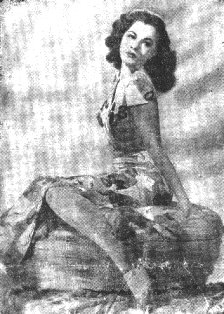 Maria Montez, meet the fellows of CBI-land. Fellows - now, don't crowd, please - meet Miss Montez.
Unfortunately, the Shapely Universal actress lives in a strange country called the United States and likes
it too well to leave for the enchanting East.
Maria Montez, meet the fellows of CBI-land. Fellows - now, don't crowd, please - meet Miss Montez.
Unfortunately, the Shapely Universal actress lives in a strange country called the United States and likes
it too well to leave for the enchanting East.
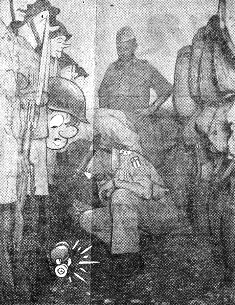
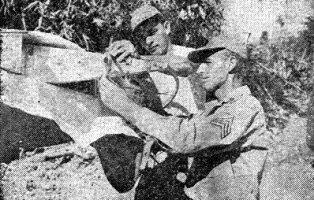 A damaged wingtip presents no particular problem to Cpl. James W. Vild and Sgt. Paul L. Denley, skilled at their
trade.
A damaged wingtip presents no particular problem to Cpl. James W. Vild and Sgt. Paul L. Denley, skilled at their
trade.
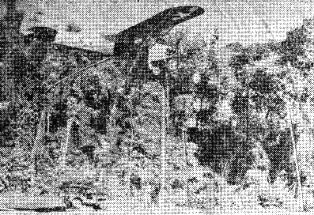 A Cub swoops down and picks up a message from an outpost. This is but one of a multiplicity of tricky tasks
for the liaison planes.
A Cub swoops down and picks up a message from an outpost. This is but one of a multiplicity of tricky tasks
for the liaison planes.
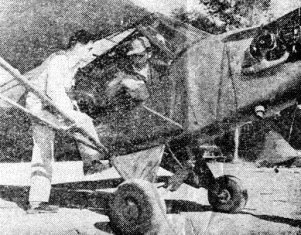 Lt. Shy Greenspan boards one of the Cubs for a flight over the Burma front. S/Sgt. Charles Brown is the pilot.
Lt. Shy Greenspan boards one of the Cubs for a flight over the Burma front. S/Sgt. Charles Brown is the pilot.
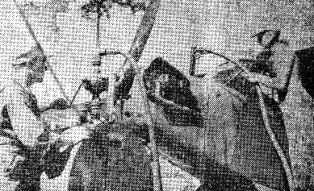 S/Sgt. Elmer Guerra operates the hand pump and T/Sgt. Charles Procter handles the hose at the "Corner Gas Station."
S/Sgt. Elmer Guerra operates the hand pump and T/Sgt. Charles Procter handles the hose at the "Corner Gas Station."
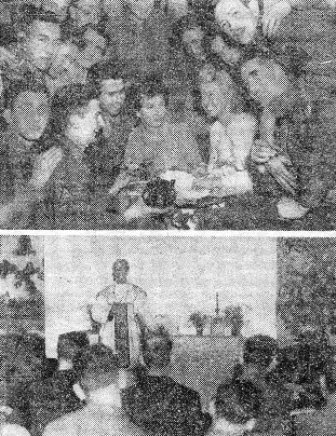 1-Surrounded by Forward Echelon HQ are two Red Cross Misses who helped make Christmas in China a gala event.
Eleanor Liss, left, and Gerry Lennox, two hard-working girls.
1-Surrounded by Forward Echelon HQ are two Red Cross Misses who helped make Christmas in China a gala event.
Eleanor Liss, left, and Gerry Lennox, two hard-working girls.
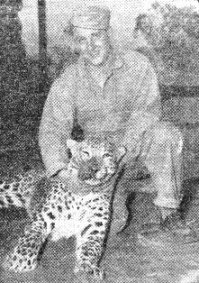 Japs aren't the only beasts hunted by American soldiers overseas. Pvt. Leo T. Keahey recently bagged a
123-pound leopard in India. Although Keahey, stationed at a Chinese-American Training Center, has shot several
small leopards, jackals and deer on earlier trips, this was his first big "kill" in the Theater.
Japs aren't the only beasts hunted by American soldiers overseas. Pvt. Leo T. Keahey recently bagged a
123-pound leopard in India. Although Keahey, stationed at a Chinese-American Training Center, has shot several
small leopards, jackals and deer on earlier trips, this was his first big "kill" in the Theater.
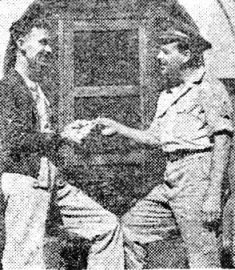

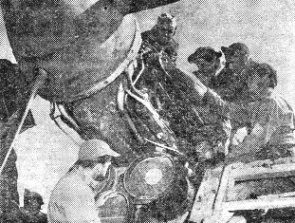 Six of the ground crew members who dood it, left to right: T/Sgt. Wellington W. White, S/Sgt. Edward C. Webb,
T/Sgt. Cecil A. Stephens, T/Sgt. Jack Scorgie, S/Sgt. Ray R. Siber, Jr., and S/Sgt. Myron S. Gilbertson.
Six of the ground crew members who dood it, left to right: T/Sgt. Wellington W. White, S/Sgt. Edward C. Webb,
T/Sgt. Cecil A. Stephens, T/Sgt. Jack Scorgie, S/Sgt. Ray R. Siber, Jr., and S/Sgt. Myron S. Gilbertson.
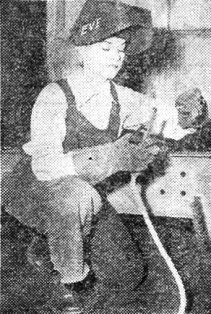 Guess who. Never thought to say Paulette Goddard, did you? The shapely paramount star is rigged up
for her latest role. She had originally planned to wear a trickier outfit, something "rather close fitting,"
but she changed her mind when it was pointed out that women in war plants might copy her costume and cause no end
of mashed fingers and lost production hours.
Guess who. Never thought to say Paulette Goddard, did you? The shapely paramount star is rigged up
for her latest role. She had originally planned to wear a trickier outfit, something "rather close fitting,"
but she changed her mind when it was pointed out that women in war plants might copy her costume and cause no end
of mashed fingers and lost production hours.
